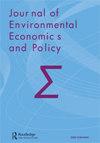条件评估研究中政策和支付后果处理对支付意愿的相反影响
IF 1.2
Q3 ENVIRONMENTAL STUDIES
Journal of Environmental Economics and Policy
Pub Date : 2020-09-04
DOI:10.1080/21606544.2020.1816218
引用次数: 5
摘要
摘要越来越多的研究调查了额外的后果性脚本对受访者支付意愿和/或他们在调查领域的信念的影响。然而,尽管这两种替代信念可能产生不同的影响,但这些工作几乎没有明确区分政策和支付后果。本研究采用分样本方法探讨了额外政策和支付后果脚本对受访者的WTP和陈述信念的影响。计量经济学分析显示,政策和支付后果脚本分别对受访者的投票行为产生了显著的积极和消极影响。尤其是后一个剧本比前一个更有影响力。支付后果性脚本也被发现在改善受访者陈述的支付后果性信念方面显著有效。这些结果表明,强调调查的支付后果性对于鼓励受访者对假设情景表现出更谨慎的态度很重要,从而减少既定偏好方法中的某些形式的偏见。本文章由计算机程序翻译,如有差异,请以英文原文为准。
Opposite impacts of policy and payment consequentiality treatments on willingness-to-pay in a contingent valuation study
ABSTRACT A growing number of studies investigated the effects of additional consequentiality scripts on respondents’ willingness-to-pay (WTP) and/or their beliefs in the survey arena. However, these works barely provide a clear distinction between policy and payment consequentiality, despite the possible varying effects of these two alternative beliefs. This study explored the impacts of additional policy and payment consequentiality scripts on respondents’ WTP and stated beliefs using a split-sample approach. Econometric analyses revealed that the policy and payment consequentiality scripts had significantly positive and negative impacts on respondents’ voting behaviours, respectively. Especially, the latter script was more influential than the former one. The payment consequentiality script was also found to be significantly effective in improving respondents’ stated payment consequentiality beliefs. These results suggest that emphasising payment consequentiality of a survey is important to encourage respondents to exhibit more careful attitudes towards a hypothetical scenario, thereby reducing some forms of bias in stated preference methods.
求助全文
通过发布文献求助,成功后即可免费获取论文全文。
去求助
来源期刊

Journal of Environmental Economics and Policy
ENVIRONMENTAL STUDIES-
CiteScore
4.70
自引率
7.70%
发文量
26
 求助内容:
求助内容: 应助结果提醒方式:
应助结果提醒方式:


